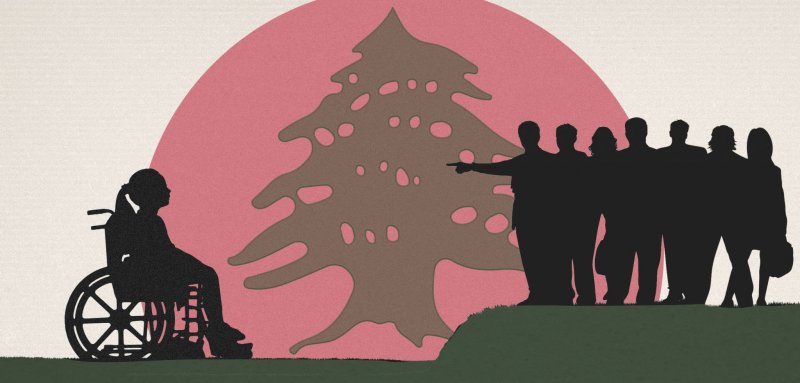People with disabilities in Lebanon have the right to education without discrimination. However, nearly 19 years after that right was guaranteed under Law 220, the government has still not taken the necessary steps to fully put it into practice. Lebanon’s new budget proposal, approved by Cabinet on May 27 and sent to Parliament’s general assembly on July 9, risks backsliding even more. Parliament should revise the budget to ensure basic rights for children with disabilities, not entrench their marginalization.
Children with disabilities have the basic human right to be free from discrimination, and that includes attending mainstream schools. But Human Rights Watch has found that Lebanon’s public education system discriminates against children with disabilities, often denying them admission to schools because of their disability. The minority who do enroll don’t get the quality education they deserve, as schools often lack reasonable accommodations, such as modifications to the classroom environment and physically accessible buildings.
Many children with disabilities in Lebanon aren’t in school at all or attend segregated institutions funded by the Social Affairs Ministry that are not mandated to provide an education. We found that the educational resources at many of these institutions are of poor quality, and a lack of monitoring, poor evaluation systems, and a lack of formal accreditation raised serious concerns about whether these institutions fulfill children’s right to an education.
People with disabilities in Lebanon have the right to education without discrimination. However, 19 years after that right was guaranteed, the government has still not taken the necessary steps to fully put it into practice
The United Nations expert body on disability rights underscored that “inclusive education is incompatible with institutionalization.” But Instead of boosting funding to make public schools more inclusive, the proposed budget would slash these funds, while increasing funds to the institutions that segregate children with disabilities from their communities and don’t provide the education they need.
We analyzed the draft 2019 state budget that the Cabinet endorsed and that was leaked to the media before the Finance and Budget subcommittee amended it. We found that the Education Ministry’s budget lines for equipping primary and secondary schools with technical and other equipment for people with disabilities would be cut by $138,000 – 30 percent less than for 2018. The budget for constructing primary school buildings accessible for children with disabilities would be cut by 25 percent. It is unclear whether the Finance and Budget Committee, which made some amendments to the budget, revised those numbers.
Sylvana Lakkis, president of the Lebanese Union for People with Physical Disabilities, an advocacy and support group, told us that accessibility is one of the main obstacles to an inclusive education. She maintained that although Law 220 obligated the state to make its public buildings physically accessible, the government has not yet allocated a budget line dedicated for this purpose, and that very few of the schools are accessible for people with physical disabilities.
A 2009 survey by the Union found that only 5 of 997 public schools observed in Beirut and Mount Lebanon met all of Lebanon’s physical accessibility standards for public buildings. According to a 2013 UNESCO report, the Education Ministry had made only five public schools in the entire country accessible. Our research in 2018 found that the situation has not improved.
Lakkis said that the government had not made adequate accommodations for students with disabilities to take the state exams in June. She is aware of at least three cases in which students had registered their disability with the relevant body beforehand, as required, but found on the day of the exam that no accommodations had been made for them.
Meanwhile, the proposed 2019 budget increases the funding allocated for programs run by the Social Affairs Ministry by around 39 percent. According to the ministry’s website, some of these programs channel students with disabilities into segregated institutions. Such segregation often entrenches discrimination against these students. However, the Social Affairs Ministry has historically reneged on funding commitments to these institutions, causing some to close or significantly decrease their programming.
While it is important for the Social Affairs ministry to provide the necessary support services to meet the developmental needs of children with disabilities, it is the Education Ministry’s primary responsibility to ensure the right of children with disabilities to inclusive education. The Social Affairs Ministry’s services need to be coupled with a deinstitutionalization policy that includes educating children with disabilities in mainstream schools.
Children with disabilities should be guaranteed meaningful choices and opportunities to be enrolled in mainstream schools if they choose, and to receive quality education on an equal basis with, and alongside, children without disabilities. Greater interaction between children with and without disabilities can decrease the marginalization that children with disabilities face in Lebanese society today and begin to dismantle the cultural stigma around disability, creating a more enriching educational experience for all students.
Parliament should carefully review the provisions in the budget related to the inclusion of people with disabilities, and they should prioritize putting Law 220 fully into operation. They should ensure that that sufficient resources are directed toward making public buildings, like schools, more accessible for persons with disabilities. And they should ensure that the schools have adequate services for children with disabilities when they get there.
Aya Majzoub is the Lebanon and Bahrain researcher at Human Rights Watch. Follow her on Twitter @Aya_Majzoub.
Raseef22 is a not for profit entity. Our focus is on quality journalism. Every contribution to the NasRaseef membership goes directly towards journalism production. We stand independent, not accepting corporate sponsorships, sponsored content or political funding.
Support our mission to keep Raseef22 available to all readers by clicking here!
Interested in writing with us? Check our pitch process here!





